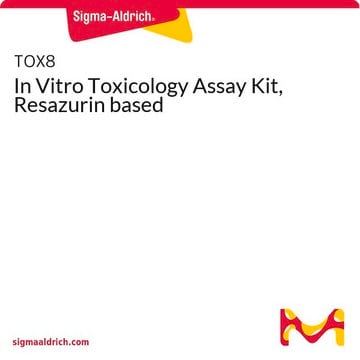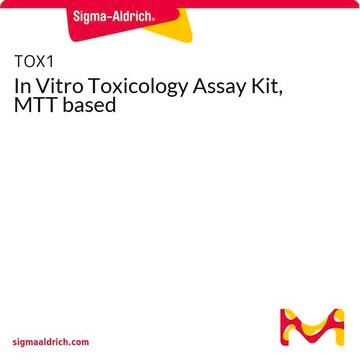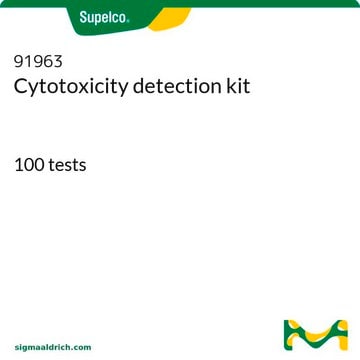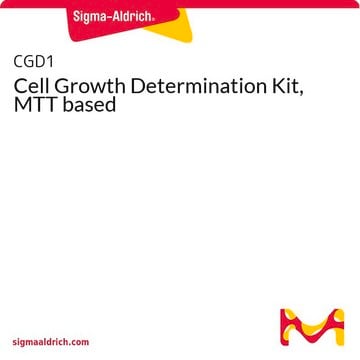TOX4
In Vitro Toxicology Assay Kit, Neutral Red based
Synonym(s):
NR uptake assay, Neutral red assay
Sign Into View Organizational & Contract Pricing
All Photos(1)
About This Item
UNSPSC Code:
12352207
NACRES:
NA.84
Recommended Products
form
liquid
usage
kit sufficient for 1,000 tests
packaging
pkg of 1 kit
storage condition
dry at room temperature
λmax
540 nm
application(s)
cell analysis
detection
detection method
colorimetric
storage temp.
2-8°C
General description
For spectrophotometric measurement of viable cells. Absorbance of converted dye is measured at a wavelength of 540 nm.
Application
In Vitro Toxicology Assay Kit, Neutral Red based has been used:
- to measure the lysosomal enzyme activity in HB8902 cells
- to study the cell viability of human alveolar epithelial cells
- to study the cell viability in fibroblasts
Biochem/physiol Actions
Neutral red (NR) is a red dye that accumulates in the lysosome by actively transferring across the cell membranes. The dye is extracted and the uptake is quantitated by spectroscopy. The NR uptake assay is the most commonly used cytotoxicity test. It is widely applicable in environmental and biomedical studies to estimate the number of viable cells in culture. The NR dye in vitro tissue culture studies is used in assessing viral cytopathogenicity and detection of toxic compounds.
Signal Word
Danger
Hazard Statements
Precautionary Statements
Hazard Classifications
Carc. 1B - Flam. Liq. 3 - Skin Sens. 1
Storage Class Code
3 - Flammable liquids
WGK
WGK 3
Flash Point(F)
73.4 °F
Flash Point(C)
23 °C
Certificates of Analysis (COA)
Search for Certificates of Analysis (COA) by entering the products Lot/Batch Number. Lot and Batch Numbers can be found on a product’s label following the words ‘Lot’ or ‘Batch’.
Already Own This Product?
Find documentation for the products that you have recently purchased in the Document Library.
Customers Also Viewed
Guillermo Repetto et al.
Nature protocols, 3(7), 1125-1131 (2008-07-05)
The neutral red uptake assay provides a quantitative estimation of the number of viable cells in a culture. It is one of the most used cytotoxicity tests with many biomedical and environmental applications. It is based on the ability of
Barbara Kazuń et al.
BMC veterinary research, 16(1), 216-216 (2020-06-27)
The aim of the study has been to compare the effect of dietary supplementation of β-1,3/1,6-glucan, Lactobacillus plantarum bacteria or their mixture on the growth performance, selected parameters of the immune system as well as the liver and intestinal histology
D Triglia et al.
In vitro cellular & developmental biology : journal of the Tissue Culture Association, 27A(3 Pt 1), 239-244 (1991-03-01)
A new three-dimensional human skin model consisting of several layers of actively dividing and metabolically active human neonatal foreskin-derived fibroblasts and epidermal keratinocytes grown on nylon mesh has been used to assess the in vitro toxicity of test agents from
Thorsten M Seyler et al.
Arthroscopy : the journal of arthroscopic & related surgery : official publication of the Arthroscopy Association of North America and the International Arthroscopy Association, 33(2), 374-386 (2016-10-04)
To evaluate the biological, immunological, and biomechanical properties of a scaffold derived by architectural modification of a fresh-frozen porcine patella tendon using a decellularization protocol that combines physical, chemical, and enzymatic modalities. Porcine patellar tendons were processed using a decellularization
H Babich et al.
Ecotoxicology and environmental safety, 21(3), 327-336 (1991-06-01)
The PLHC-1 fish hepatoma cell line (Poeciliopsis lucida) was used in the neutral red assay to evaluate the acute cytotoxicities of direct-acting (alkylbenzenes, phthalate diesters, and pesticides) and metabolism-mediated (benzo[a]pyrene) toxicants. The sequence of cytotoxic potencies for the alkylbenzenes and
Our team of scientists has experience in all areas of research including Life Science, Material Science, Chemical Synthesis, Chromatography, Analytical and many others.
Contact Technical Service










